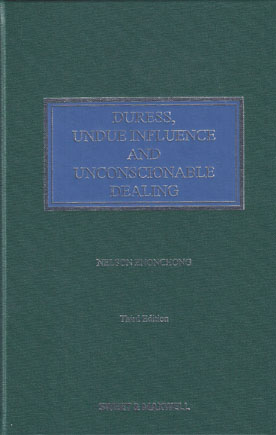
Part of the Contract Law Library, the third edition of Duress, Undue Influence and Unconscionable Dealing provides an account of the law relating to these areas.
Duress, Undue, Influence and Unconscionable Dealing are grounds on which a contract could be avoided by one of the parties because his/her consent was obtained by some form of pressure which the law considers unacceptable.
Duress deals with circumstances where the complainant’s consent was obtained by the use of illegitimate pressure, such as a threat of physical violence or economic pressure.
Undue influence deals with cases where one person has acquired influence over another and that influence is exercised in an unacceptable manner to procure the consent of the other person to enter into a contract.
Unconscionable dealing is concerned with cases where one party is suffering from some special disability, such as poverty, ignorance, illness, necessity, intoxication, (the weaker party) and the other party (the stronger party) makes an unconscientious use of his position of power to impose terms which are unfair to the weaker party. The stronger party may be guilty of unconscionable dealing even though he has not exercised any form of pressure on the weaker party.
Key features: